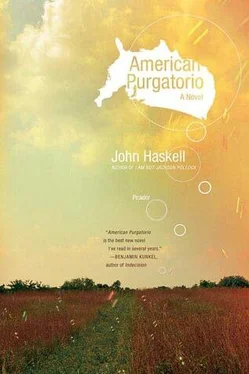John Haskell - American Purgatorio
Здесь есть возможность читать онлайн «John Haskell - American Purgatorio» весь текст электронной книги совершенно бесплатно (целиком полную версию без сокращений). В некоторых случаях можно слушать аудио, скачать через торрент в формате fb2 и присутствует краткое содержание. Год выпуска: 2006, Издательство: Picador, Жанр: Современная проза, на английском языке. Описание произведения, (предисловие) а так же отзывы посетителей доступны на портале библиотеки ЛибКат.
- Название:American Purgatorio
- Автор:
- Издательство:Picador
- Жанр:
- Год:2006
- ISBN:нет данных
- Рейтинг книги:3 / 5. Голосов: 1
-
Избранное:Добавить в избранное
- Отзывы:
-
Ваша оценка:
- 60
- 1
- 2
- 3
- 4
- 5
American Purgatorio: краткое содержание, описание и аннотация
Предлагаем к чтению аннотацию, описание, краткое содержание или предисловие (зависит от того, что написал сам автор книги «American Purgatorio»). Если вы не нашли необходимую информацию о книге — напишите в комментариях, мы постараемся отыскать её.
Los Angeles Times
American Purgatorio — читать онлайн бесплатно полную книгу (весь текст) целиком
Ниже представлен текст книги, разбитый по страницам. Система сохранения места последней прочитанной страницы, позволяет с удобством читать онлайн бесплатно книгу «American Purgatorio», без необходимости каждый раз заново искать на чём Вы остановились. Поставьте закладку, и сможете в любой момент перейти на страницу, на которой закончили чтение.
Интервал:
Закладка:
We walked together, up the hill to a lagoon near an official-looking building, a museum or a library, and we stood in front of this lagoon. We were standing there, and I was holding the green plastic garbage bag containing, not her laundry, but her cat. I was about to throw it in the water and I said, “Do you have anything you want to say?” She was wearing a black silk dress from the 1940s, with lace, and a very sensual hat, and she said, “You’re the writer, you say something.” I didn’t even know the cat, and I said, “Well, what was the cat like?” And she said, “That cat had a mind of its own.” A mind of its own, I thought, and I said, “Here’s to its own mind,” and I swung the bag and threw it out into the lagoon. And we watched it. We watched it float. For about fifteen minutes we watched it float out there on the surface of the water and we wanted it to sink, we wanted it to go under the water, but it didn’t want that. It wanted to float right where it was. So we didn’t know. I found a stick or branch that was lying in the mud and with it, I reached out and pulled the bag back to shore. I untied the knot, folded down the sides, reached in and felt a paw down there. I took hold of the paw, pulled it up, and sure enough, it was a dead cat. I knew it was dead, not because it was stiff, but because it was so still. It was absolutely motionless. It was swaying slightly, but no air was passing in or out, so I kicked the garbage bag out of the way, swung the cat until it got enough momentum, and then threw it back into the lagoon. And we watched it. Again. We watched it keel over to one side and float there on the water. We wanted the cat to sink, but the cat had a mind of its own.
V. ( Gula )
1
I’m driving south, through the Colorado mountains, and although I’m looking for clues, I’m no longer certain that the clues I’m seeing are clues for me. For instance, I’m not sure if the turn signal of the car in front of me is sending me a message to turn or not. Snow-capped mountains are on my right and dry piñon hills are on my left, and when I stop for a barbecue sandwich in a motel town called Buena Vista, the lady in the imitation covered wagon tells me about a hot springs nearby that is supposed to “heal your bones,” and I interpret “bones” to mean something unseen inside a person’s skin.
That sounds good, so I drive up the alluvial hill, along a winding stream, and find the wind chimes marking the entrance to the hot springs. I drive into the gravel parking lot and it looks like every other two-story motel but this one has water, a series of grotto-like bathing pools set in the hill. People are floating in them, and scattered around the grounds — above the gates and doorways — are hand-painted signs and Indian symbols, reminding visitors of the sanctity of the waters. PEACE IS INFECTIOUS, they say, and LISTEN TO THE EARTH.
A pregnant white-haired girl at the check-in desk tells me that all the rooms in the lodge are taken, but a teepee, she says, is available. So I take my sleeping bag into this teepee, which has a dirt floor, a bunk bed, and a fire pit in the middle. I wash up in the bathroom in the lodge and for about a day my life consists of soaking in the pools of different degrees of heat, floating on foam pads, and at night, more floating, looking up at the stars.
The employees are friendly and healthy, and they all have tattoos or piercings. I talk to a few of them, including the girl from the front desk, who lives in the lodge. She wears loose colorful clothing, and one morning, when the pools are quiet, she offers me a tarot reading. I’m not interested, I say, or ready yet, but after a morning soak I feel comfortable enough to sit with her on the thick red carpeting in the dimly lit recreation room.
Her skin is like slightly tinted milk, her eyes soft, her voice sincere, and sitting on her heels she seems the perfect person to give me some direction, not any direction, but the one direction that will lead me to the reunion with my wife. That she believes she’s psychic seems reasonable because everybody seems to be psychic, and maybe everybody is. I tell her a little about myself, tell her my experience so far has been fine but now I want to move on. I say I want to act, and that I’m willing to do it, to see the world with a new view, and because of that new view, be different. I want to fill up the minutes I have with a broader, more inclusive perspective, and that’s what I’m doing now. I’ve never had an aura reading before, never sat cross-legged in a recreation room with a pregnant girl dressed like an Indian who is about to tell me my future.
“Okay,” I say.
“Good,” she says. She decides we have to move to more private quarters, so we walk out to my teepee. She brings along a candle and some rugs, and she sits at the edge of the fire pit, lighting the candle and placing it in the ashes of the pit. At first I stay perched on the bottom bunk of the bed, watching her preparations, but since she’s brought along a rug for me, in the end we both sit, cross-legged, the candle burning between us.
At first she’s accurate, talking about loss, and tribulation. She tells me I haven’t found what I’m looking for, and that to do that, I need a new direction, a direction. So what she’s saying, so far, is accurate. When I ask her a more specific question, a question related to Anne, she advises me to move on and forget the past. “The person you’re thinking about,” she says, “is gone.”
Well at first I refuse to accept that. I ask her what person she’s talking about, but I know what person. And it’s not that I can’t get enough of Anne. She’s just there. My thoughts just naturally keep coming back to her, and the girl is suggesting I change my thoughts.
I think about what that might be like. To change my thoughts. And why not? I can exercise a little self-control. When thoughts of Anne start coming to me, I can think of something else. I can notice my thoughts and then change them. I can think about the wind outside the teepee, or the goats I saw that afternoon climbing diagonally up the hillside.
So that’s what I do. And it takes some concentration but it works. And because it works I let myself relax. And when I do, every thought that comes to me is a thought of Anne. The happiness I’ve had with her is a real thing, and every time I think of her, what I feel is the absence in my body. It’s painful, but I can’t stop it. In the absence of Anne, I manufacture her, and it isn’t even an urge, it just happens. My determination to change my mind is overpowered by an urge to maintain the sadness, because that sadness is connected to Anne.
The pregnant girl is telling me about the person she’s sensing (Anne), mentioning things I both admire and dislike, telling me that none of it matters because this person is part of the past. As she says this, thoughts, in the form of images, are coming to me. For instance, the time Anne tried to take my photograph. She wanted it to be perfect. She was having trouble with the focus and the light meter, and I saw her desire to succeed. I saw who she was — who she was and what she needed — and I loved who she was. I saw her ambition and her eagerness and her optimism, and I say optimism because optimism was the foundation of our love.
She may or may not have been beautiful, but to me she was beautiful, and what was beautiful was her being. When we love people, what we see are the flaws that make them human. Anne’s flaws made our love seem superlative, and I counted myself lucky being in the light of that love. The light was missing now, but as I remembered her, it came back to me. Her uncompromising need for perfection, a trait that at best I put up with, now I longed for. I sat in the teepee, finding Anne in my mind, and liking her there, wondering if maybe I was liking her memory a little too much, but then thinking no, it would probably help. It would probably make it easier to find her if I had her in my mind.
Читать дальшеИнтервал:
Закладка:
Похожие книги на «American Purgatorio»
Представляем Вашему вниманию похожие книги на «American Purgatorio» списком для выбора. Мы отобрали схожую по названию и смыслу литературу в надежде предоставить читателям больше вариантов отыскать новые, интересные, ещё непрочитанные произведения.
Обсуждение, отзывы о книге «American Purgatorio» и просто собственные мнения читателей. Оставьте ваши комментарии, напишите, что Вы думаете о произведении, его смысле или главных героях. Укажите что конкретно понравилось, а что нет, и почему Вы так считаете.











